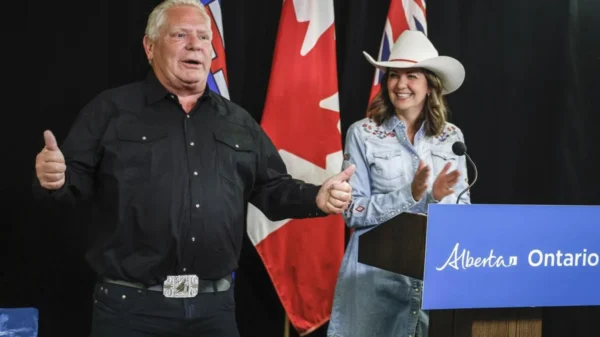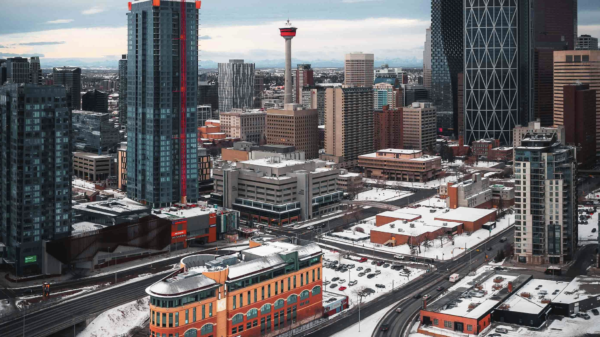Canada’s cannabis retail market could see a huge boost to revenues if it was modeled more like some of the less-restricted U.S. states, an industry expert says.
Ivan Ross Vrana, VP of government relations and business development Eve & Co (TSX-V: EVE), said it’s important the industry bands together to deliver a stronger message to Ottawa and provincial governments that regulations could be relaxed while still maintaining health and safety objectives.
“I fully support having safety regulations, but we have this mindset that we should treat this product like its more dangerous than plutonium,” said Ross Vrana.
After legal sales captured just 15 per cent of Canada’s estimated $6 billion weed market in its first year, critics are calling on all three levels of government to look at changing some of the onerous regulations they say are holding the industry back. This includes bans on advertising, consumption lounges and other restrictions that make it harder for sellers to attract consumers to legal stores.
Read more: Cannabis-infused dining flourishes despite being illegal
For Ross Vrana, who was Health Canada’s senior policy advisor for its Medical Marihuana Access Regulations (MMAR) program from 2008 to 2012, regulations need to relax if cannabis stores in Canada are to live up to their potential.
“I think there’s a lot of retailers that are trying extremely hard to be creative within the regulations,” he said. “And they are trying to make an interactive place where people come in, but you’re sort of hemmed in by the rules and you can only do so much.”

Photo courtesy of Planet 13
Ross Vrana points to burgeoning U.S. cannabis markets like Nevada that allow cannabis retailers to advertise, and offer an entertaining experience to attract high-roller tourists.
Last week, Las Vegas-based retailer Planet 13 (CSE: PLTH) announced it sold US$63 million at its one SuperStore location last year, selling to 695,000 customers at an average ticket value of over US$90.
The company has lured in tourists by adding a cafe, pizzeria, an event centre and a multi-level cannabis art museum to its massive store. However, the retailer will have to wait until 2021 to add a on-site consumption lounge, when Las Vegas City Council says it will first allow pot shops to apply for permits to do so.
Also, under Nevada state law, Planet 13 can advertise its cannabis business so long as it doesn’t target children, and can prove more than two-thirds of the advertising audience is over the age of 21.
Meanwhile, Canadian retailer Inner Spirit (CSE: ISH), which operates 43 stores across three provinces, said last week it sold $29 million in 2019 while serving 740,000 customers. That’s an average ticket of just $39.

Munchies anyone? Las Vegas-based Planet 13 lures high-volume traffic at its cannabis SuperStore with an added pizzeria, cafe, and interactive weed gallery. Photo courtesy of Planet 13
So far, no jurisdiction in Canada allows pot shops to feature tourist-friendly pizzerias or cafes on store premises.
The Alberta Gaming, Liquor and Cannabis, which has approved over 300 cannabis stores, the most out of any province in Canada, told Mugglehead there are “no provisions for cannabis retailers to run multiple businesses.” Such a move would require changes to provincial legislation, the regulator said.
And Ross Vrana said because Health Canada restricts companies from advertising, tourists may not know where they can purchase or consume cannabis legally, which is likely leaving millions of dollars on the table.
He said if the federal government wants to achieve its stated goal of reducing the black market, regulations will need to change.
“I’m not saying to deregulate everything and just open the industry up, but I think there’s a new approach that needs to happen,” Ross Vrana said. “And I think what isn’t happening yet is a robust discussion on what the new approaches can look like.”
Health Canada did not reply to a question on cannabis advertising regulations before press time.
Edmonton could pave way for cannabis consumption lounges
Ross Vrana said legalizing consumption lounges would also attract consumer interest.
However, the market segment doesn’t exist in Canada as no jurisdiction has provided a licence for such a site.
But Edmonton city councillor Mike Nickel wants to change that, and is taking the first steps to do so.

San Francisco-based SPARC Cannabis is one of a dozen consumption lounges operating in the Bay Area. Photo courtesy of SPARC Cannabis
Coun. Nickel and his Ward 11 administration will sit down Jan. 16 at a round table to discuss what cannabis consumption lounges would look like, while keeping in mind jurisdictions like San Francisco, which has successfully allowed consumption lounges since 2018.
His team will be talking with more than a dozen industry players, such as Alberta-based Aurora Cannabis (TSX: ACB) and Fire & Flower (TSX: FAF).
Nickel said he wants to expand Edmonton’s cannabis edible market by offering a safe space for patrons to consume infused brownies and beverages. His business background makes him a rare pragmatic politician, he added, which is what the cannabis industry needs right now to change its current fortunes.
“Look, I’m an impatient guy,” Nickel said. “I’m only in here for four years and then I’m gone and retired. But this is a huge economic development opportunity for the City of Edmonton that’s why I’ve gone after this cannabis bylaw.”
For Nickel, major policy shifts often start from the bottom up, and if his city’s bylaw for cannabis consumption lounges passes, and the model is proven safe, it could lead the way for Alberta and other provinces to follow.
He would like to see all levels of government eventually treat cannabis the same way alcohol is treated, including allowing advertising similar to the U.S.
“It’s a multi-billion dollar industry and we’re just shaving the top, and it seems absurd to me that we’ve got this double standard going on as a business model,” Nickel said.
His motion for future cannabis consumption lounges will be read at Edmonton City Council on Feb. 26.
Read more: America’s first cannabis cafe opens in Hollywood
jared@mugglehead.com
@JaredGnam














